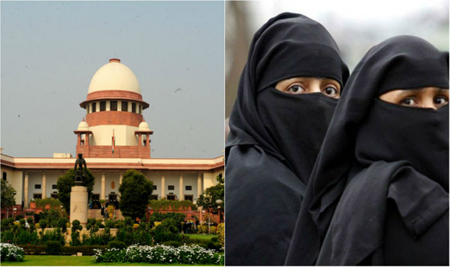
“There is one important consideration which we have to bear in mind—and I want my Muslim friends to realise this—that the sooner we forget this isolationist outlook on life, it will be better for the country. …. This attitude of mind perpetuated under the British rule, that Personal Law is part of religion, has been fostered by the British and by British courts. We must, therefore, outgrow it.”—Shri K M Munshi, Member Drafting Committee, Constitution of Bharat, on Tuesday, the 23rd November 1948 CONSTITUENT ASSEMBLY OF INDIA—VOLUME VII
Shayara Bano case of 2017 was not the first one that brought the critical issue of gender justice for the Muslim women before the court, nor was the Shah Bano case of 1986. Still, the recent case involving Shayara Bano and others is different in terms of character and reference points.
Way back on January 21, 1886 the British controlled judiciary in Abdul Kadir vs Salima And Anr case discussed this issue in the Bharatiya context. First time, the verses from the Holy Quran were cited to explain the Muhammadan Law of Marriage by Mr. Justice Mahmood. The legislation of Shariat Act 1937 and subsequent interpretations in the post-Independent cases has a direct bearing of this tradition. Another set of judgements in which Justice VK Iyer was involved, Bai Tahira A vs Ali Hussain Fissalli Chothia of October 6, 1978 and Fuzlunbi vs K. Khader Vali And Anr case of May 8, 1980, are landmark in this regard which many of us forget. Prior to Shah Bano case the question of maintenance vis-à-vis minority rights was deliberated upon extensively in these cases which further became the basis for decision in 1986 in favour of Shah Bano.
The recent case and folling judgement involving Shayara Bano and others is different on many counts.
Throughout this struggle, the main issue was of maintenance and alimony. So Article 125 and 127 of Criminal Procedure Code were the reference points. The recent case for the first time addressed the issue whether the custom of ‘Triple Talaq’ is an integral part of religious practice and if it is in conflict with the Fundamental Rights enshrined in the Constitution. Thus, the whole set of Fundamental Rights, including Articles 14, 15 and 25, were the reference points for argument. The main petitioner and subsequent writ petitions asked many questions in this regard and the Supreme Court decided to address them. It is significant that even after citing the same Quranic verses, the SC considered Triple Talaq as not essential part of the religion, even though by 3:2 majority.
In Shah Bano case also the court had gone with the cause of gender justice. It was the lack of political will and communal consideration of vote-bank, in the name of secularism, that turned around the judgement overnight. The then Congress Government, under the leadership of Rajiv Gandhi, enacted the Muslim Women (Protection of Rights on Divorce) Act, 1986. This Act brought in the most controversial provision that gave a Muslim woman the right to maintenance for the period of iddat which is about about three months after the divorce, and shifted the onus of maintainance to her relatives or the Wakf Board. This was the most gender insensitive move undertaken to appease the Muslim fundamentalists. Contrary to that, the present Government not only assured Muslim women to stand by their rights but also filed affidavit in the court with clear intent. In fact, Prime Minister Modi, in his Independence Day speech, lauded efforts by the Muslim women for their consistent and collective efforts. Considering this more as a gender justice issue rather than a vote-bank issue was certainly a big game changer in this case.
The biggest credit should go to the collective efforts of the Muslim women who stood against the tyranny of the fundamentalists. All earlier struggles, including that of Shah Bano, were by and large individual. Shayara Bano, Aafreen Rehman, Gulshan Prveen, Ishrat Jahan and Aliya Sabri went to the court with individual petitions. Organisations like the Bharatiya Muslim Mahila Andolan galvanised the opinion of women throughout the country in favour of the move. This form of collective Shakti challenged the fundamentalist voices from Jamiat Ulma-i-Hind and All India Muslim Personal Law Board on the basis of same Quran they have been quoting to deny them the rights.
The legal fraternity and policy makers will undoubtedly have to sit tight on the judgement to understand the nuisances and act upon. The guarded still bold approach by judiciary, political will shown by the Government and collective efforts of the Muslim women has certainly brought this transformation, which was not visible 30 years ago. It is time for the reformist voices in the Muslim community to come forward and bring out the community from the black-hole of isolation against which the Constitution makers had warned.
By Prafulla Ketkar
Courtesy: Organsier














